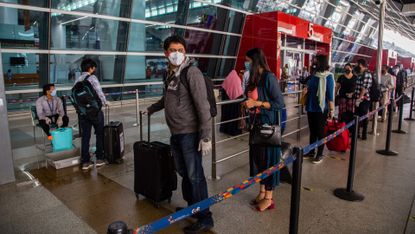How long will India be on UK’s Covid travel ‘red list’?
Critics say ban on new arrivals comes too late amid rising fears over Indian variant of the virus

India has become the 40th country to be added to the UK’s travel ban “red list” as Covid cases soar in the South Asian nation.
From 4am on Friday 23 April, anyone who has been in or travelled through India in the previous ten days will not be allowed into the UK unless they are British or Irish nationals or have residence rights. And those allowed over the border will face a mandatory ten-day quarantine in a government-approved hotel.
Health Secretary Matt Hancock told the House of Commons on Monday that adding India to the UK travel ban list was necessary to “protect the progress we’ve made in this country in tackling this awful disease”. But some critics claim the move has come too late.
Subscribe to The Week
Escape your echo chamber. Get the facts behind the news, plus analysis from multiple perspectives.

Sign up for The Week's Free Newsletters
From our morning news briefing to a weekly Good News Newsletter, get the best of The Week delivered directly to your inbox.
From our morning news briefing to a weekly Good News Newsletter, get the best of The Week delivered directly to your inbox.
How bad is the situation in India?
India currently has the highest number of daily confirmed Covid cases in the world.
“The situation in India has deteriorated, with an extremely rapid rise in cases detected throughout April,” the Department for Transport said in a statement yesterday. Local rates have almost doubled over the past week, with the authorities reporting a record 273,810 new infections on Monday.
“Hospitals have a shortage of beds, oxygen and key medicines, and infections have passed 15 million,” says Reuters.
Sign up for Today's Best Articles in your inbox
A free daily email with the biggest news stories of the day – and the best features from TheWeek.com
How is the red list determined?
The list of banned countries is decided by ministers, with help from the Joint Biosecurity Centre (JBC), which includes epidemiologists and other analysts from across government.
The JBC assesses other countries’ transmission of Covid variants, potential new variants, surveillance and sequencing capability, and travel connectivity with the UK.
The DfT says that, despite current travel restrictions, “there is a high volume of travel between India and the UK”, with 103 cases of a new India variant already reported here.
Samples of the virus are being analysed to see if the variant has any “concerning characteristics”, such as greater transmissibility or resistance to treatments and vaccines, reports The Telegraph.
Meanwhile, “ministers have been accused of waiting too long to impose a travel ban on India”, where the variant was first detected late last year, says The Times.
Shadow home secretary Nick Thomas-Symonds said that there had been warning signs from India for weeks and that it was “not good enough to try and shut the door after the horse has bolted”.
How long will the lists be in place?
Ministers have said that the current red list is likely to be expanded when the government introduces a traffic light system to open up travel, possibly as early as 17 May.
Countries will be placed on a red, amber or green list, and all travellers will be tested for Covid both pre-departure and on arrival in the UK. Those from amber countries will also be required to self-isolate for ten days.
“The allocation of countries will be kept under review and respond to emerging evidence, with a particular focus on variants of concern,” the DfT announced earlier this month.
The traffic light restrictions will be formally reviewed on 28 June to see whether any measures can be rolled back. “Further formal reviews will take place at checkpoints no later than 31 July and 1 October 2021,” the department said.
Create an account with the same email registered to your subscription to unlock access.
-
 One great cookbook: Madhur Jaffrey's 'Vegetarian India'
One great cookbook: Madhur Jaffrey's 'Vegetarian India'The Week Recommends The 2015 tome will reshape how you think about both vegetables and Indian food
By Scott Hocker, The Week US Published
-
 On the trail of India's wild lions at Sasan Gir National Park
On the trail of India's wild lions at Sasan Gir National ParkThe Week Recommends The sanctuary is a 'roaring' conservation success
By The Week UK Published
-
 Kerala: one Indian state, four exhilarating ways
Kerala: one Indian state, four exhilarating waysThe Week Recommends The southwestern region pretty much has it all, from beachfront, to port metropolis, to verdant mountainside
By Scott Hocker, The Week US Published
-
 Tropical Modernism: Architecture & Independence – rise and fall of unique design
Tropical Modernism: Architecture & Independence – rise and fall of unique designthe week recommends A 'nuanced' and 'scholarly' examination of European architecture across the 'late British empire'
By The Week UK Published
-
 Breathtaking: the Covid drama that may make you scream
Breathtaking: the Covid drama that may make you screamThe Week Recommends ITV three-parter is a 'tour de force' that exposes 'political complacency'
By Chas Newkey-Burden, The Week UK Published
-
 7 of the world's most unusual museums
7 of the world's most unusual museumsThe Week Recommends Yes, Beijing has a museum devoted to tap water
By Catherine Garcia, The Week US Published
-
 India's spicy dispute over the origins of butter chicken
India's spicy dispute over the origins of butter chickenWhy Everyone's talking about Rival claims at the 'centre of a saucy real-life drama roiling India'
By The Week UK Published
-
 Poonam Pandey: the Indian model who faked her own death
Poonam Pandey: the Indian model who faked her own deathWhy Everyone's Talking About The Bollywood star has a reputation for outlandish stunts
By Sorcha Bradley, The Week UK Published

